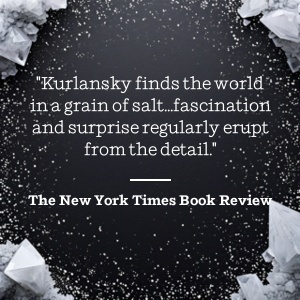معلومات عنا
حقوق الطبع والنشر © 2024 Desertcart Holdings Limited


Salt: A World History [Kurlansky, Mark] on desertcart.com. *FREE* shipping on qualifying offers. Salt: A World History Review: The "Sapiens" of Salt! - A comprehensive overview of human evolution thru the use of Salt. Very well written, educational and entertaining. I will never look at Salt the same way again! I highly recommend this historical adventure. I would love to do a tour of many places discussed in the text. Good job! Review: Salt... an engaging history - This book is well worth reading... as it gives a different perspective to world history... Salt... which for most of history has been an expensive commodity. The Gandhi history as it pertains to salt was especially helpful as most books skim over the reasons for the protests without clearly explaining them. However as you reach the end of the book you feel as if the author has reached his word limit and concludes without completing the work. Some of the concluding comments are on anti-caking agents (magnesium carbonate, calcium silicate and sodium hexacyanoferrate II) and additives (Fluoride & Iodine). [...] However the book fails to expand on any of this... cyanide? Not worthy of some explanation? Fluoride? Not even a mention of any controversy? It's effect on enzymes ie. cooking. Yet Iodine (much less controversial) gets a fair bit of attention. Go figure? The book fails to mention the one anti-caking agent that is probably the most common: aluminium. The book really ought to have included a bit more on coloured salts... which often have a magnificent taste... but instead it's jammed up at the end and disposed of in an almost cursory manner. Missing bits: It is intriguing that a book might be written about salt and the chemical formula is not drawn anywhere ie. NaCl (or Na+ Cl- in solution). Good detail... missed the punch line? The author misses the reason for fermentation... which is healthy because it donates many healthy bacteria to support the gut ie. it's an excellent probiotic. The dismissal of May butter while noting that it was reputed to have health properties was annoying. May is the month that spring occurs in the northern hemisphere... and that will also correspond with maximal Vitamin K2 production... which is almost certainly why butter has a reputation as a health food in this month. It was enjoyable to go for a ride around the globe... including a huge amount of detail on Chinese salt making... a country that so many authors skip when writing a book. Likewise the photos of some of these unusual slices of history were great eg. chinese drilling rigs which drilled to 4400 feet with only bamboo. Although you're left wishing there were even more of them. There was a fair bit of detail about cooking with salt: various historical recipes many of which helped capture the period under discussion brilliantly. The writing style was engaging throughout the book so you won't get bored. If you're curious you'll enjoy the book because you'll learn lots of stuff about salt you didn't know. :-)



| Best Sellers Rank | #13,060 in Books ( See Top 100 in Books ) #1 in Rocks & Minerals #8 in Gastronomy History (Books) #23 in History of Civilization & Culture |
| Customer Reviews | 4.3 4.3 out of 5 stars (4,327) |
| Dimensions | 5.02 x 0.86 x 7.67 inches |
| ISBN-10 | 0142001619 |
| ISBN-13 | 978-0142001615 |
| Item Weight | 11.6 ounces |
| Language | English |
| Print length | 496 pages |
| Publication date | January 28, 2003 |
| Publisher | Penguin Books |
M**M
The "Sapiens" of Salt!
A comprehensive overview of human evolution thru the use of Salt. Very well written, educational and entertaining. I will never look at Salt the same way again! I highly recommend this historical adventure. I would love to do a tour of many places discussed in the text. Good job!
M**R
Salt... an engaging history
This book is well worth reading... as it gives a different perspective to world history... Salt... which for most of history has been an expensive commodity. The Gandhi history as it pertains to salt was especially helpful as most books skim over the reasons for the protests without clearly explaining them. However as you reach the end of the book you feel as if the author has reached his word limit and concludes without completing the work. Some of the concluding comments are on anti-caking agents (magnesium carbonate, calcium silicate and sodium hexacyanoferrate II) and additives (Fluoride & Iodine). [...] However the book fails to expand on any of this... cyanide? Not worthy of some explanation? Fluoride? Not even a mention of any controversy? It's effect on enzymes ie. cooking. Yet Iodine (much less controversial) gets a fair bit of attention. Go figure? The book fails to mention the one anti-caking agent that is probably the most common: aluminium. The book really ought to have included a bit more on coloured salts... which often have a magnificent taste... but instead it's jammed up at the end and disposed of in an almost cursory manner. Missing bits: It is intriguing that a book might be written about salt and the chemical formula is not drawn anywhere ie. NaCl (or Na+ Cl- in solution). Good detail... missed the punch line? The author misses the reason for fermentation... which is healthy because it donates many healthy bacteria to support the gut ie. it's an excellent probiotic. The dismissal of May butter while noting that it was reputed to have health properties was annoying. May is the month that spring occurs in the northern hemisphere... and that will also correspond with maximal Vitamin K2 production... which is almost certainly why butter has a reputation as a health food in this month. It was enjoyable to go for a ride around the globe... including a huge amount of detail on Chinese salt making... a country that so many authors skip when writing a book. Likewise the photos of some of these unusual slices of history were great eg. chinese drilling rigs which drilled to 4400 feet with only bamboo. Although you're left wishing there were even more of them. There was a fair bit of detail about cooking with salt: various historical recipes many of which helped capture the period under discussion brilliantly. The writing style was engaging throughout the book so you won't get bored. If you're curious you'll enjoy the book because you'll learn lots of stuff about salt you didn't know. :-)
A**R
Great Book about the history of salt
I am a qualified Nutritionist and Naturopath and I appreciate reading books that are rich in meaningful information. I bought this book because I had increasingly noted that the concerns we have about table salt are unfounded. So I decided to do some research. To get a good handle on salt, I needed to go back in time (hence this book) to understand the use of salt throughout history, and then relate that to more recent studies that were conducted. There were as many studies claiming salts benefits and there are many claiming salt is bad. So that did not give me any confidence that everyone was singing from the same hymn sheet. Whenever I see conflicting study outcomes, I immediately look to see whether we are comparing apples with apples, and we were not. You see, there are actually 3 types of salt and one is very good and two are not so good. Most studies did not even point this out, or realised that we humans eat three very different types of salt. So let me try to make sense of this: I have certainly come to the conclusion that many others have already come to, that the benefits of eating generous amounts of the right salt to suit one’s taste is justified, and much better than being paranoid and limiting my intake. But we need to choose the right salt. What I did learn was that ocean salt is about 85% Sodium Chloride and the remaining 15% is this wonderful suite of over 84 minerals. The thing is, the salt processors remove the 15% part which is the really valuable portion, and sell it as Magnesium Oil. Once you understand that there are three types of salt (1) pure ocean salt (2) ocean salt with the 15% minerals removed and (3) tables salt being pure sodium chloride plus added free-flowing additives and iodine, then it all become very clear. If you eat the pure 100% sea salt you can have as much as you like (of course being sensible) whilst the others (#2 & 3) should be restricted. The 'bottom line' is that many people are not getting enough salt which causes dehydration, and this insufficiency of water in the human body has all sort of consequences such as thicker blood (ie blood with high viscosity) and reduced metabolic function caused by low body fluid levels. This can have all sorts of consequences such as fatigue, increased colds and flu's, and hundreds of other ailments as the body struggles to move fluid around efficiently. The old line that salt is high in sodium and sodium increases blood pressure is a very simplistic explanation and one wonders how the population was ever duped into believing it. Years ago before we had refrigeration we would store our meats in barrels of salt and we ended up consuming a lot of salt. Whilst not suggesting we go back to those times, I would suggest that for most healthy people that 5-8 grams of salt per day for an adult is fine and will not increase blood pressure. Only those on salt-restricted diets need to concerned about limiting salt. I have written a short paper about Salt and Magnesium Oil and some readers may like to download it to help understand the benefits of salt. You can download it here: https://drive.google.com/folderview?id=0B4XGKNybHkRkb1lZT2N3VTgyXzQ&usp=sharing
R**R
El libro intenta hacer una historia paralela, contandonos la evolución del uso y comercio de la sal, y el impacto de éste en la economía global del periodo. Interesante, merece la pena echarle un rato
E**Y
This was a great book that led me down a wormhole of food history books.
Z**L
This book is like a very long article on salt. The history is overwhelming. I've been looking for a reference book like that and I don't know how I missed it. Arrived on time. I enjoy reading it. It's a book for general readers, don't have to be an academic to understand.
ビ**ル
You want to read about salt? Wrong book. You want to read about how salt affected civilisations? You've come to the right place. A great in-depth read and analysis of human civilisation; empires grew and empires declined because of salt.
S**K
Salt! There is a history of salt. I mean why wouldn’t there be, right? What a great read, with style, compassion, and a contagious interest and passion for the subject, if not those along the way. 100% recommend.
ترست بايلوت
منذ شهرين
منذ 5 أيام